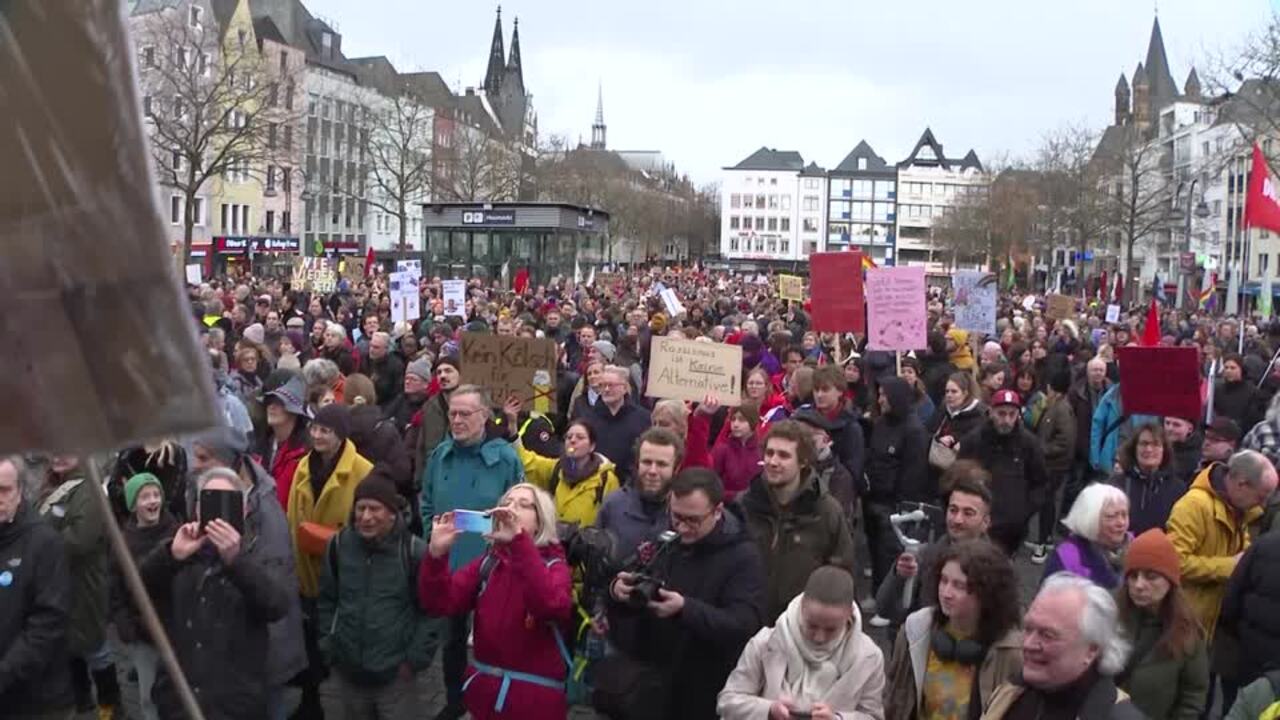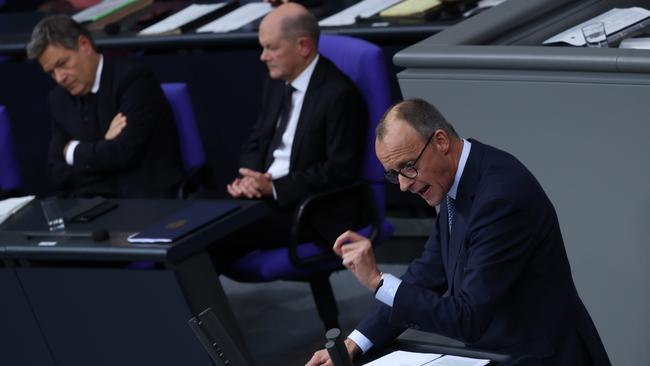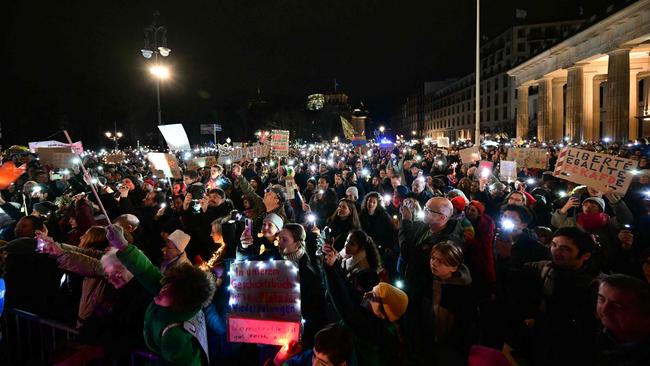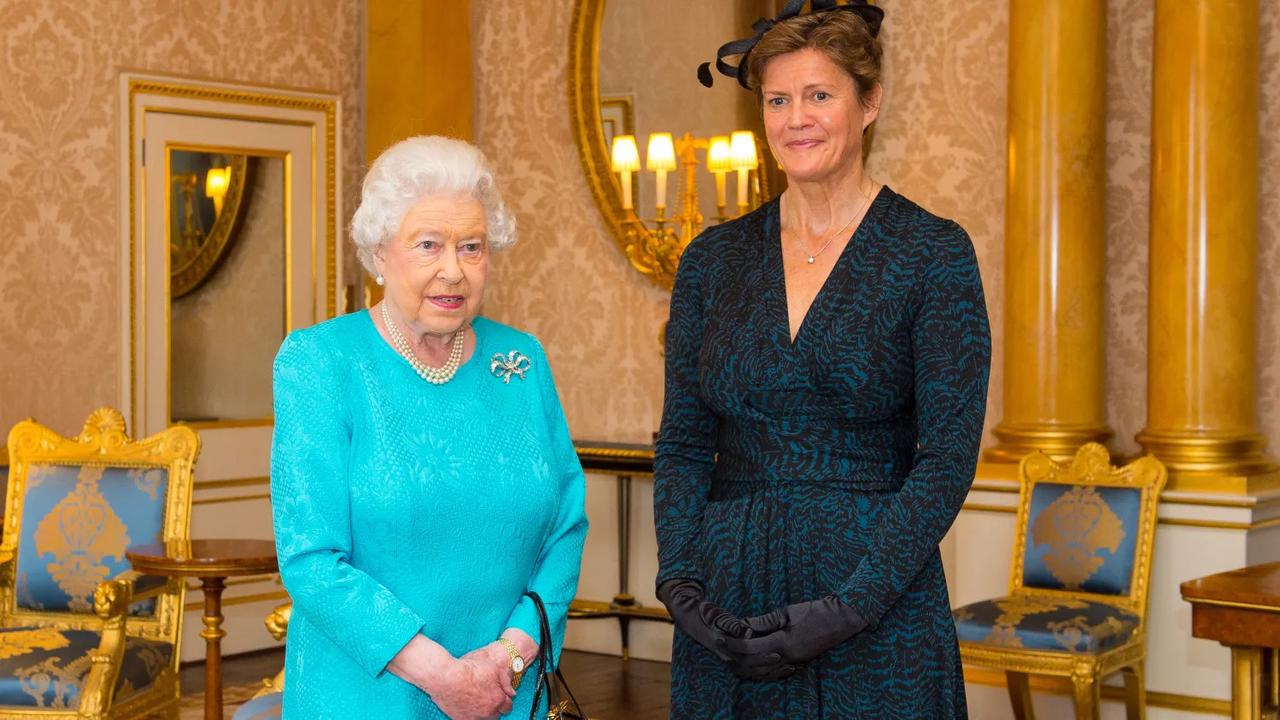Germany’s ‘foundations shaken’ by CDU asylum deal with hard-right AfD
The party expected to win February’s election is accused of tearing down the ‘firewall’ erected to keep out hard-right forces, by relying on support from the AfD for a controversial motion.

Germany’s chancellor-in-waiting was accused of shaking the foundations of the country’s postwar democracy as his conservative party passed a hugely controversial motion on asylum by relying on support from the hard right.
On one of the most tense and rancorous afternoons in the Bundestag’s recent history, Friedrich Merz became the first German leader to win a significant parliamentary vote through the backing of the radical right-wing Alternative for Germany (AfD) party, breaching one of the state’s most cherished taboos.
Merz’s opponents, including Olaf Scholz, the chancellor, claimed that he had made an “unforgivable mistake” and had torn down the “firewall” that had been erected to keep hard-right forces out of power after the Nazis.
In a speech of uncharacteristic verve and intensity, Scholz said Merz was establishing “common ground” with right-wing extremists, “destroying” European law, shredding Germany’s reputation and tearing up the legacy of its greatest postwar chancellors.

The country’s election campaign has come to a melodramatic head this week after a series of murders and terrorist attacks by immigrants culminated in the fatal stabbing of a man and a two-year-old child by an Afghan failed asylum seeker in the Bavarian town of Aschaffenburg.
Polls show that a large majority of the public are frustrated with the government’s measures to curb irregular immigration and want more radical steps.
Merz, the leader of the opposition Christian Democratic Union (CDU) and frontrunner in the race for the chancellorship, is seeking to harness this anger with a five-point plan to bring an “end to illegal immigration”.
It envisages the blanket rejection of undocumented migrants at Germany’s borders and the indefinite detention of all foreign citizens slated for deportation.
Merz argues that the only way to halt the rise of the AfD, which is polling in second place behind the CDU and has now reached 23 per cent in some surveys, is for the democratic centre to put forward aggressive measures of its own instead of “permanently ignoring the will of the majority”.
These include declaring a national emergency under EU law and effectively sealing off Germany’s frontiers to most asylum seekers. Critics argue that this would immediately be struck down by the courts, infuriate neighbouring countries and shred the country’s standing in the world.
However, Merz told MPs: “We simply owe it to the people in our country, and not least to the victims of the acts of violence over the past few months, to try everything we can to limit illegal immigration, to take the asylum seekers who are under deportation orders into custody, and finally to deport them.”
Turning directly to Scholz, he asked: “What actually has to happen in Germany? How many more people have to be murdered, how many children have to fall victim to acts of violence, before you take the view that this is a situation where public security and order are in danger?”

Merz insisted he would not work with the AfD and admitted that he felt “deeply uneasy” about the prospect of forging a majority with the party. Yet he said Germany was faced with a choice between “continuing to look on helplessly as the people in our country are threatened, injured and murdered” or “standing up straight and doing what is absolutely necessary in this matter”.
After an irascible debate punctured by heckling, in which Merz complained that Scholz was spreading “vile and infamous” insinuations about his person, and a senior AfD MP was reprimanded by the Speaker for calling the chancellor’s Social Democratic Party (SPD) a “bunch of Nazis”, the vote was decided by the slimmest of margins.
The Bundestag passed Merz’s asylum motion, which is not legally binding, by only three votes out of 703, as the AfD and the centre-right Free Democrats joined forces with the CDU. It sets the stage for the AfD to back a draft law drawn up by the CDU and its Bavarian affiliate, the CSU, tomorrow (Friday).
Alice Weidel, the AfD’s candidate for the chancellorship, said she was backing the initiative because Germany was sliding into an “abyss” of lawlessness and Merz had “copied” her party’s asylum policies.
MPs from the SPD and its Green party coalition partner lambasted Merz and the CDU for forming a majority with the hard right.
Robert Habeck, the Green vice-chancellor, described the AfD as an “adder draped around the neck of the CDU-CSU” and dripping poison into the conservatives’ bloodstream.
Dirk Wiese, a veteran SPD MP, said Merz was dragging Germany down the same path as Austria, where the centre right is expected to support the country’s first hard-right chancellor.
“You are opening the door to a right-wing extremist party,” he told Merz. “You are turning them into a party that is acceptable at dinner parties and in coalitions.”
A few hours earlier the Protestant and Catholic churches had also launched an unusually vehement attack on Merz and the CDU.
In a joint statement, senior clerics said they were “deeply alienated by the timing and tone of the debate”, which was “likely to defame all migrants living in Germany” and “stir up prejudices”.
The Times



To join the conversation, please log in. Don't have an account? Register
Join the conversation, you are commenting as Logout